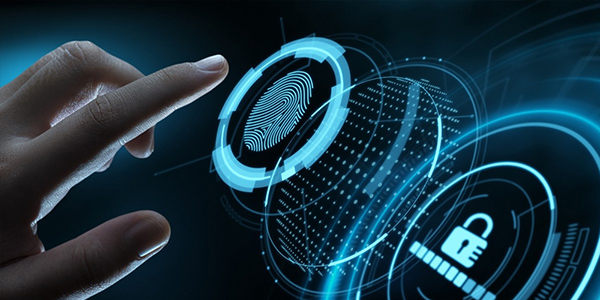Princeton Identity is a global leader in multi-modal, multi-factor authentication biometric technology for access control solutions.
By David Soyka, Senior Editor, Industry Today
“Here’s looking at you” is a familiar toast. Princeton Identity biometric technology looks people in the eye to get familiar with who they are and where they are supposed to be.
Which is why so many manufacturers, commercial businesses and government agencies are toasting Princeton Identity for its innovative solutions for access control, time and attendance and security.
If you have a Samsung smartphone, you are already using Princeton Identity recognition technology. “Our patented iris detection solution allows users to easily unlock their phones with a click glance,” notes CEO/President Bobby Varma.
Biometric technology actually dates back some 15 years, which Princeton Identity (then a division of SRI International) pioneered and holds numerous patents. Princeton Identity biometric technologies were applied to a range of government and commercial needs related to cybersecurity; meanwhile Apple came out with its famous fingerprint authentication for the widely popular iPhone.

“Fingerprinting is actually a biometric technology,” Varma notes, adding that, “However, it has a negative connotation. Fingerprinting is usually associated with law enforcement and getting arrested.”
Hence the development of iris technology as an alternative for Samsung smartphones. Apple later implemented its own face recognition technology, though fingerprint recognition remains a convenience option for many iPhones still in use, as well Apple laptops and the highly popular iPad. “Apple made fingerprinting a cool technology,” Varma notes.
Samsung and SRI saw the opportunity to commercialize iris detection for security applications and launched Princeton Identity, staffing the small company with veteran SRI management and biometric experts.
“Iris detection is another modality companies could implement along with fingerprinting to secure access,” Varma explains. “The traditional way to secure building access was a card reader that either granted automatic access or that was presented to security personnel to verify. But people forget their cards or lose them altogether, and it isn’t unusual for people to borrow someone else’s card.”
She adds, “There are a number of problems with card-based security. One, it is a hassle for users, to remember to keep the card with them and having to take extra steps to get access if they forget it. Then if they lose the card or the card is damaged, they then have to go through the process all over again of getting a new replacement card.
“For the company, it is a security issue. If people share cards or they end up in unauthorized hands, there’s no real authentication or control. It is even more of a problem if you are relying on a security guard to authenticate the cards; that whole process is open to abuse. People tend to get complacent with hundreds and maybe thousands of people coming through every day. It becomes a mundane task and it’s just a fact of human nature that people stop paying attention to accurate identification.”
In contrast, biometric technology—fingerprinting, facial recognition and/or iris scanning—ensures authorized access control and security. The onset of the pandemic further incents adoption of contactless recognition technologies.
“All you have to do is look in a scanner, there’s nothing you have to touch,” Varma says. “It not only provides greater convenience to users, it provides the highest levels of safety and security.”
Another pandemic-related advantage is contactless temperature sensing. “There’s no need to have a person lean into another person to take their temperature, which is kind of defeating the whole purpose of social distancing,” Varma notes. “With our platform, we have a two-step process. First the person is authenticated using iris or facial scanning. Then the scanner takes the person’s temperature. If the person doesn’t have a fever, the door is unlocked to wherever they need to go. But if they have a fever, access is denied and the incident recorded and security personnel might be alerted.”
Varma adds that, “Unlike other temperature sensing applications, we identify the person who has the high temperature so appropriate action can be taken. Our system not only ensures that only authorized people can gain access to a location, it helps ensure they enter safely.”
Yet another advantage during the pandemic is that biometric recognition systems aren’t confused by masks or gloves. “There’s no guesswork about whether the face on the card matches the person wearing a mask,’ Varma says. “You don’t have to take your mask off or your gloves. All you need is to walk up to let the scanner look at your eye.”
While the pandemic has prompted greater interest in facial and eye recognition, Varma emphasizes that Princeton identity offers the broadest perspective not only for fast and secure access and identity control, but also time and attendance tracking.
“Today, Princeton Identity is recognized not just for iris detection, but multi-modal, multi-factor authentication. By multi-modal we mean iris and face detection and by multi-factor, the use of cards and pin numbers. We pride ourselves on our innovative, customer-centric approach to design custom solutions across a variety of industries not only with our IDS series software platform, but also a range of hardware.”
Hardware products include the Access200 scanning product family, Access600e access kiosk and portable contactless, tri-modal security shelter capable of processing up to 15 persons per minute. The hardware is manufactured at both Princeton Identity and with various contract manufacturers.
Princeton Identity’s scalable cloud-based or virtual machine software platform for identity management employs an intuitive, easy-to-use web interface for multimodal and multifactor biometric identification, including face, iris and PINs.
The company markets both to end-users and systems integrators. “We offer out-of-the-box integration with leading physical access control systems. Our software features powerful REST API, an application program interface that allows for easy integration into any existing customer system,” Varma points out.
“Once you enroll in our software platform, it can become the backbone for multiple other applications and can achieve greater operational efficiencies,” Varma notes. “So, for example, you have access control for your employees, you could then use the same employee information for time and attendance tracking. Or if you have security cameras, you could integrate camera monitoring. We have our own hardware, but we can easily integrate other hardware.”
Varma does note that, “There’s always the concern about what if someone hacks the system, how do you ensure that someone’s picture won’t get stolen for nefarious purposes? Actually, no one’s image is associated with biometric data, so there’s no risk of identity fraud should there be a security breach. If someone were to get your biometric data, there’s no way they can connect that data to an individual person.”
It is, however, highly unlikely that biometric data could be compromised. Thanks to its work with a number of government agencies where data security is perhaps even more paramount than in the commercial sector, Princeton Identity employs the highest levels of encryption and a rigorous process to store a secure format of biometrics data that can’t be traced to an individual.”
She adds that any privacy concerns notwithstanding, employees are quick to see the convenience of biometrics technology. “You walk up to the system and that’s all you have to do. When we explain this to employees about how easy this is, they become less concerned. These days people use platforms like Instagram and Snapchat and the like, and are comfortable using them where there are more potential privacy issues than with our biometrics solutions.”
Varma points to Princeton Identity’s extensive experience and expertise in working with high-end government customers and Samsung as one of its primary competitive differentiators. “There are other biometric companies, but Princeton Identity offers an all-important blend of customizable solutions that are highly convenient, easy to use and fast, backed by superior customer support.”
It comes down to the old adage of time is money. “Manufacturers in particular are concerned with increasing uptime and improving efficiencies. There’s nothing more inefficient that people waiting in line to get access into a building. Our solutions can process anywhere between 12 to 20 people per minute so they can get to the assembly line floor or wherever they need to go quickly without unnecessary delay. And particularly during COVID, process them safely.”
If that weren’t enough, here’s an added incentive to employ Princeton Identity solutions. “We recognize that manufacturers and businesses have suffered during COVID and money for new expenses are tight,” Varma says. “That’s why we’ve initiated a program where companies don’t have to commit a lot of money upfront to purchase one of our systems. Instead, you can pay on a monthly or yearly basis to use the system. You have access to the latest technology, the latest upgrades without having to make a big capital investment.”
That’s something a lot of companies can identify with.
Princeton Identity was originally a division of SRI International, a company with roots in the development of color television and Siri, among other innovative technologies. It was launched as a separate venture in 2016 to focus on further commercializing security and access control.

Bobby Varma is the co-founder and CEO of Princeton Identity, a leading biometric technology company. Bobby has a proven track record as an executive in biometrics arena for 10 years of driving sales and developing products. Her current focus is on structuring business alliances with commercial entities across the world and educating market on biometric domain applications.
In her previous role at Princeton Identity, VP of Operation and Products, she built product organization from ground up and brought biometric products to market successfully. Her responsibilities also included overseeing operations to build efficiency and processes across the organization. She managed team of technical and product staff.
Prior to joining Princeton Identity, Ms. Varma was a Director of Products and Business Development at SRI. She led their business development for “Iris on the Move” product line. She developed relationships with high profile customers and initiated large programs within government entities. Since joining SRI in 1997, Varma has worked as a scientist in the area of drug discovery and medical devices. She has managed programs in imaging, medical devices and silicon IP. As a business development manager, she was instrumental in securing funding for “in the ear” device from government and commercial individuals.
Varma holds her MS in Biomedical Science from Drexel University and BS in Biochemistry from Rutgers.
This article is sponsored by Princeton Identity.
Scott Ellyson, CEO of East West Manufacturing, brings decades of global manufacturing and supply chain leadership to the conversation. In this episode, he shares practical insights on scaling operations, navigating complexity, and building resilient manufacturing networks in an increasingly connected world.